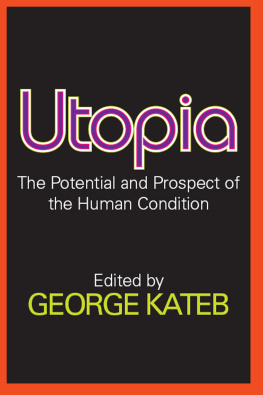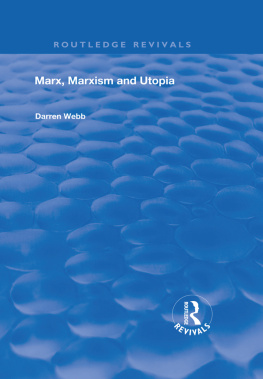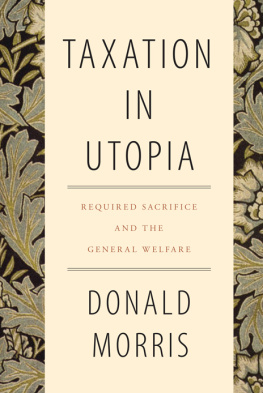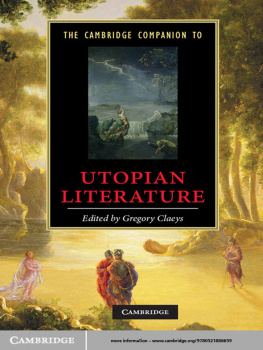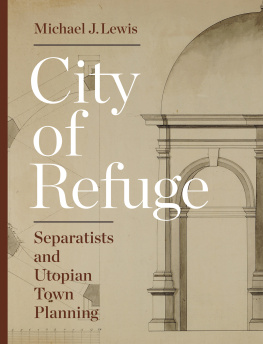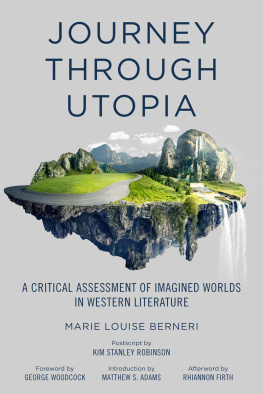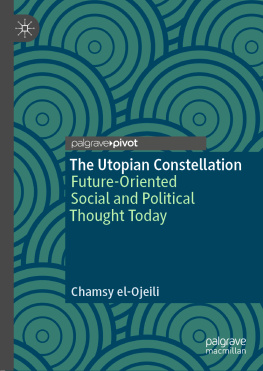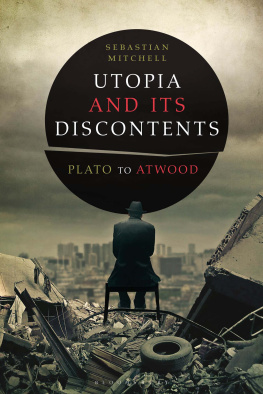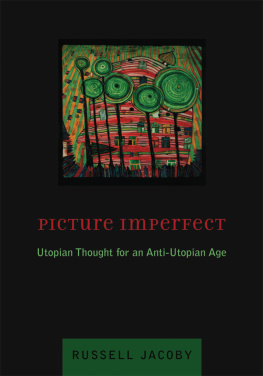First published 1971 by Transaction Publishers
Published 2017 by Routledge
2 Park Square, Milton Park, Abingdon, Oxon OX14 4RN
711 Third Avenue, New York, NY 10017, USA
Routledge is an imprint of the Taylor & Francis Group, an informa business
Copyright 1971 by Taylor & Francis.
All rights reserved. No part of this book may be reprinted or reproduced or utilised in any form or by any electronic, mechanical, or other means, now known or hereafter invented, including photocopying and recording, or in any information storage or retrieval system, without permission in writing from the publishers.
Notice:
Product or corporate names may be trademarks or registered trademarks, and are used only for identification and explanation without intent to infringe.
Library of Congress Catalog Number: 2008002630
Library of Congress Cataloging-in-Publication Data
Kateb, George.
Utopia : the potential and prospect of the human condition / George Kateb.
p. cm.
Includes bibliographical references and index.
ISBN 978-0-202-36188-8 (alk. paper)
1. Utopias. I. Title.
HX806.K27 1971
335.02dc22
2008002630
ISBN 13: 978-0-202-36188-8 (pbk)
George Kateb
I
Utopia is a bore. Listen to a great modern poet in one of his most famous poems:
There is not any haunt of prophecy,
Nor any old chimera of the grave,
Neither the golden underground, nor isle
Melodius, where spirits gat them home,
Nor visionary south, nor cloudy palm
Remote on heavens hill, that has endured
As Aprils green endures; or will endure
Like her remembrance of awakened birds,
Or her desire for June and evening, tipped
By the consummation of the swallows wings.1
It is true that the main play in Wallace Stevens Sunday Morning is between mortal delight and some imperishable bliss after death and never to come, between consolations that are more than consolations and consolations that are less than nothing. But the poems force can be effortlessly directed against visions of the good life on earth. There is a sweet irony in the phrase, As Aprils green endures. Aprils green returns every year; but it appears only to vanish; it is the very symbol of all that is ephemeral, and all the more beautiful for its ephemerality. Being beautiful, it is real, and in its reality it makes the unsubstantial, the longed-for, the imaginary, appear false, unworthy. Like heaven, utopia can be brought under this indictment. Makers of utopias may share the poets scorn for fantasies of the afterlife. But they do, after all, find life as it is lived grossly insufficient, and dream of what is immeasurably better. Aprils green is not good enough for them: the idealist imagination must contrive something greener. For their pains, however, they may achieve only the poets rebuke. The pleasures of the senses must suffice, and do. Imaginary felicity is counterfeit.
Stevens poem expresses a kind of perennial hostility to utopian aspirations. There is too much in the world, it may be thought, for utopia to compete with. When there is an abundance of things in the world as we know it to sing and praise, why waste time in rejection and in trying to dream up some other world some other world, furthermore, as unlikely to come as heaven itself? Put away childish things; grow up; accept reality as it is, and the rewards will be great and genuine.
One can easily see that the sentiment behind Sunday Morning may be thought callous. It may be fine for a poet reconciled to the world and for his well-fed audience to look down on radical strivings after the good life. But what about the countless millions in their misery? Isnt Aprils green yet one more opiate for their suffering? After all, the speaker in Stevens poem is obviously a well-favored and privileged woman. She may have her own sufferings; they would be, however, the sufferings that come from surfeit. She not only can afford to indulge in the esthetic attitude, she may even be driven to it by the very fact that all her other appetites are satisfied. If that is the case, well and good. She has reached the point where the cunning of the senses must take over. She must now be artful, so as to be assured pleasures in a world that gives her all that her body needs. She is already in utopia. Her implicit point of view, however, condemns great masses of people to stay outside it. For them, Aprils green would be a substitute for a decent life, rather than the climax to it. The utopian defender is led to demand that others have the same chances she has had. He is also led to attack all those who would base an anti-utopian outlook on a sentiment like that of Stevens speaker. Let all mankind also be able to find utopia a bore.
II
If realized, would not then utopia be a cheat? Listen to the French playwright, Eugene Ionesco:
The society I have tried to depict in The Bald Soprano is a society that is perfect; I mean where all social problems have been resolved. Unfortunately, this has no effect upon life as it is lived.
The play deals with a world where economic worries are a thing of the past, a universe without mystery, in which every-think runs smoothly for one section of humanity at least. I have no doubt that this is the world of tomorrow.
I believe that it is precisely when we see the last of economic problems and class warfare that we shall also see that this solves nothing, indeed that our problems are only beginning. We can no longer avoid asking ourselves what we are doing here on earth, and how, having no deep sense of our destiny, we can endure the crushing weight of the material world.
The people in The Bald Soprano have no hunger, no conscious desires; they are bored stiff. But people who are unconsciously alienated dont even know that they are bored. They feel it vaguely, hence the final explosion which is quite useless, as the characters and situations are both static and interchangeable, and everything ends where it started.2
Ionescos argument could be filled out by reference to human experience as we already know it. There is abundant testimony in favor of the view that without the existence of many kinds of pain, physical and psychological, pleasure loses its savor. It may even lose its very meaning. It takes little sophistication to ratify what philosophers like Plato and John Stuart Mill say; namely, that for pleasure to be intense, some contrast is needed, some comparison provided by earlier or by anticipated suffering. If utopia means, above everything else, the elimination of suffering, does it not therefore necessarily mean the elimination of the preconditions of pleasure? If that is true, can we not agree with Ionesco, and others, when they suggest that utopia really does not raise the general level of human well-being, but only impoverishes human experience? Is not utopia truly a cheat?
A possible answer is that utopia is worth the risk Ionesco poses. It is worth the risk if pleasure or at least, intense pleasure is rejected as a sufficient standard. Whatever the fate of pleasure in a world hypothetically denuded of many or most of the main sources of suffering, some other huge possibility is opened up. It is a possibility just vaguely mentioned by Ionesco, and ignored by others who think like him. It is suggested by two political moralists equal in passion but separate in temperament. I refer to George Orwell and Norman Mailer.

